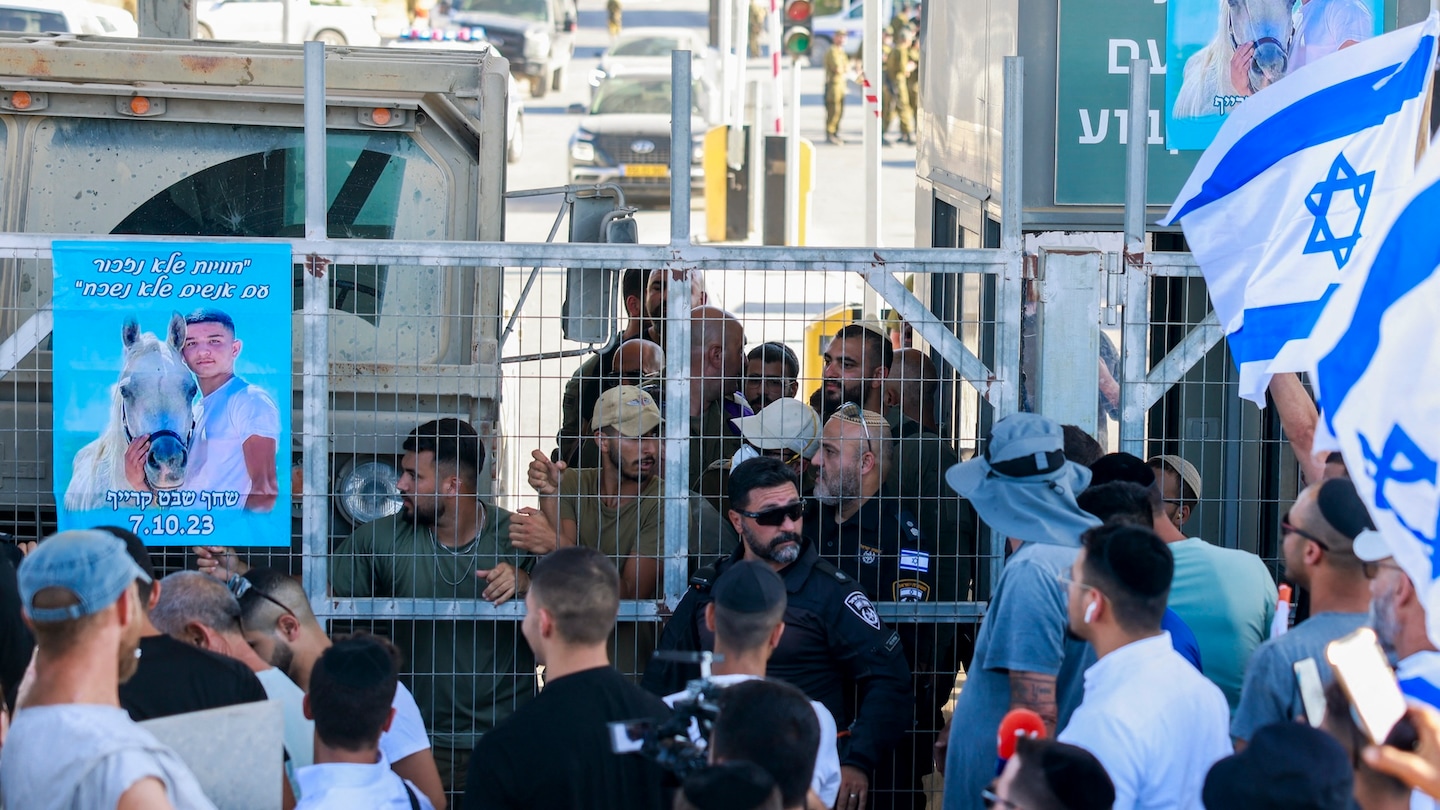“I don’t believe that a fight is inevitable,” Austin told reporters after meetings in Manila with senior Philippine officials alongside Secretary of State Antony Blinken to detail new security commitments for the Southeast Asian nation. “We would like to see things resolved in a diplomatic fashion.”
But “if Israel is attacked, yes, we will we help Israel defend itself. We’ve been clear about that from the very beginning,” Austin said.
Israel’s security cabinet authorized a military response to the weekend attack, but the specific nature of that counterstrike remained unclear even as civilians on both sides of the Israel-Lebanon border — and the region at large — braced for it.
Israeli Prime Minister Benjamin Netanyahu said on Monday that Israel “will not, and cannot, ignore this,” before vowing to retaliate: “Our response will come, and it will be severe.”
In southern Israel, the fallout continued after far-right demonstrators rallied outside and broke into the Sde Teiman military base on Monday, to protest the detention of nine reservists in connection to allegations of “serious abuse of a detainee” from Gaza.
Palestinians and rights groups say Gazans held in the military detention center have been subject to systematic abuse and torture, including alleged cases of rape and sexual assault. Under Israeli law, Palestinians from Gaza can be held for lengthy periods without charge or access to a lawyer.
Defense Minister Yoav Gallant on Tuesday lambasted events at the base, saying in a statement that they “constitute a severe blow to the country’s security and the authority of the government, which is maintained through the IDF,” or Israel Defense Forces.
Netanyahu on Monday condemned the break-in and called for calm, putting the prime minister at odds with his far-right base and politicians whose support he needs to remain in power. The melee laid bare a deepening clash between the military and Israel’s far right, which opposes reaching a cease-fire before Hamas is entirely eliminated — a war aim that Israel’s generals have warned is unrealistic.
In his statement, Gallant called on Netanyahu to investigate whether Itamar Ben Gvir — Israel’s far-right national security minister, who oversees the prison system — “prevented or delayed police action in response to the violent events that members of his party were involved in.”
Videos posted on social media Monday showed a crowd rattling the base’s metal gates and then running inside behind Zvi Sukkot, a member of the country’s parliament. In a social media post, Finance Minister Bezalel Smotrich called for the chief military prosecutor to “get your hands off the reservists,” a sentiment echoed online by Ben Gvir.
“The backing and active participation of elected officials in riots at IDF bases, along with harsh statements against senior IDF officers, is a very serious and dangerous phenomenon that harms security, social cohesion, and Israel’s image in the eyes of the world,” Gallant said Tuesday. “This dangerous phenomenon must be dealt with decisively and immediately.”
Here’s what else to know
The Gaza Health Ministry declared a polio epidemic on Monday, more than a week after Israel’s health ministry said it had detected strains of the virus in sewage. No polio cases have yet been reported. The Gaza ministry said obtaining potable water and access to soap and disinfectants for the Strip’s residents were crucial to stopping the spread of the disease. The breakdown of Gaza’s sanitation systems has also led to increases in hepatitis A, dysentery and gastroenteritis, according to Palestinian and U.N. officials.
Israeli troops pulled out of eastern Khan Younis on Tuesday, ending a more than week-long incursion into the southern Gazan city that sent tens of thousands of displaced civilians fleeing. The IDF in a statement said that it “eliminated over 150 terrorists” in addition to weapons and infrastructure. Muhammad al-Mughair, an official with Gaza’s Civil Defense, told The Washington Post that emergency crews recovered the bodies of 42 people after troops withdrew, while more than 200 people remained missing. In recent weeks, Gazans packed into the Strip’s southern and central regions have been repeatedly displaced by Israeli evacuation orders that now cover most of the territory, according to the United Nations.
Western governments are urging their citizens to leave Lebanon. Rena Bitter, the U.S. assistant secretary for consular affairs, urged Americans to leave before a crisis begins, while the British Foreign Office advised its citizens “against all travel to Lebanon.” Sweden, Ireland, and France also issued similar statements. Meanwhile, Cyprus said it is ready to receive and help repatriate civilians if tensions between Israel and Lebanon worsen. Germany and Greece’s national carriers have paused flights to Beirut for the remainder of this week.
Attacks and discrimination against Muslims and Palestinians in the United States rose by 70 percent in the first half of 2024 compared with the same period from 2023, the Council on American-Islamic Relations said Tuesday. The group said it received 4,951 complaints about anti-Muslim and anti-Palestinian incidents regarding “immigration and asylum, employment discrimination, education discrimination and hate crimes.”
At least 39,400 people have been killed and 90,996 injured in Gaza since the war began, according to the Gaza Health Ministry, which does not distinguish between civilians and combatants but says the majority of the dead are women and children. Israel estimates that about 1,200 people were killed in Hamas’s Oct. 7 attack on Israel, including more than 300 soldiers, and says 329 soldiers have been killed since the launch of its military operation in Gaza.
Birnbaum reported from Manila, Javaid from London and Jeong from Seoul. Lior Soroka in Tel Aviv and Hajar Harb in London contributed to this report.
#U.S #defend #Israel #Hezbollah #attacks #Lebanon #Austin,
#U.S #defend #Israel #Hezbollah #attacks #Lebanon #Austin
